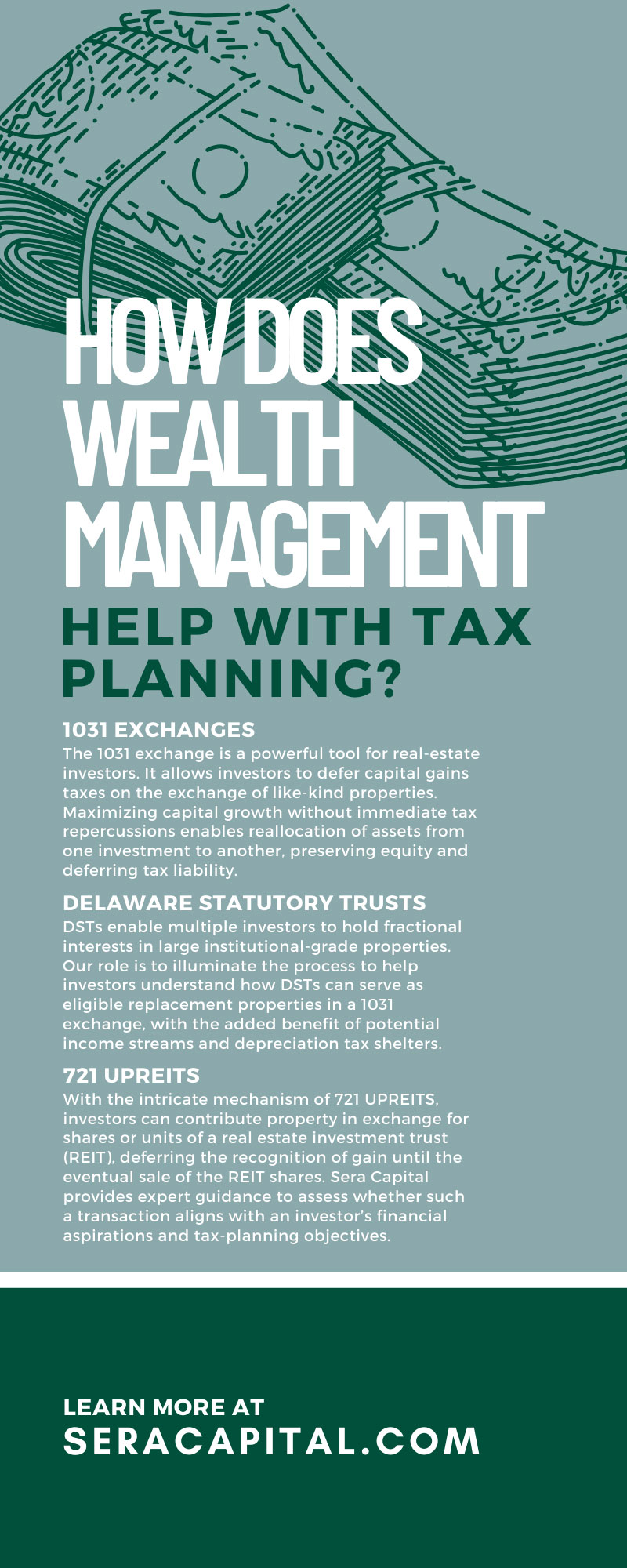How Does Wealth Management Help With Tax Planning?

Carl E. Sera, CMT
March 27, 2024

Modern tax law is constantly evolving, and the landscape of personal finance and wealth enhancement is becoming increasingly complex. As individuals strive to secure their financial futures, the fusion of tax planning with wealth management proves to be not just advantageous but imperative. In this extensive exploration, we’ll untangle the web of tax burdens and unveil how savvy wealth-management strategies play a pivotal role in ensuring that every dollar saved is a dollar earned.
The Essence of Wealth Management
Wealth management can help one achieve various financial objectives, such as wealth accumulation, preservation, and distribution. It encompasses core elements such as financial planning, investment management, and, crucially, tax planning—tools that can sculpt an individual’s financial destiny.
The core of wealth management is personalizing financial strategies based on a person’s unique circumstances. This customization sets wealth management apart from traditional financial services, which often take a one-size-fits-all approach.
Weaving Financial Planning Into the Fabric of Wealth Management
Financial planning serves as the foundation for managing your wealth. When you’re faced with the complexities of financial landscapes, the expertise of a seasoned financial planner is essential. Our approach will help you chart a course toward financial stability with clarity and confidence by clarifying a situation that might seem bewildering and establishing goals and a map to meet them.
Within this framework, tax-planning strategies are born, helping a person steer clear of financial tempests while optimizing the tax provisions they might otherwise overlook.
Tax-Planning Strategies in Wealth Management
Tax planning within the context of wealth management is a meticulous balancing act between honoring one’s civic duty while minimizing the tax bleed that can erode hard-earned wealth.
1031 Exchanges
The 1031 exchange is a powerful tool for real-estate investors. It allows investors to defer capital gains taxes on the exchange of like-kind properties. Maximizing capital growth without immediate tax repercussions enables reallocation of assets from one investment to another, preserving equity and deferring tax liability. With our keen eye for detail, Sera Capital can help you identify opportunities for such exchanges, fostering portfolio diversification while maintaining a deferral of taxation.
Delaware Statutory Trusts
For people looking to invest in real estate without the day-to-day management hassles, Delaware Statutory Trusts (DSTs) are compelling alternatives. DSTs enable multiple investors to hold fractional interests in large institutional-grade properties. Our role is to illuminate the process to help investors understand how DSTs can serve as eligible replacement properties in a 1031 exchange, with the added benefit of potential income streams and depreciation tax shelters.
721 UPREITS
With the intricate mechanism of 721 UPREITS, investors can contribute property in exchange for shares or units of a real estate investment trust (REIT), deferring the recognition of gain until the eventual sale of the REIT shares. Sera Capital provides expert guidance to assess whether such a transaction aligns with an investor’s financial aspirations and tax-planning objectives.
Section 453 Installment Sales
For business-owners contemplating the disposition of a business, a Section 453 installment sale offers a method to spread out capital gains tax over the period in which payments are received. This method, which includes deferred sales trusts and structured installment sales, may allow business-owners to align income recognition with their financial and tax-advantaged strategies while providing liquidity and preserving capital.
Sera Capital extensively evaluates these arrangements to ensure a precisely orchestrated financial picture. If you want to explore our options, make a no-obligation appointment today.
Capital Gains and Losses
Balancing capital gains with losses is a keystone of tax strategy. Investors can minimize their taxable income by intentionally realizing losses to offset gains. The strategic use of tax-loss harvesting can be deployed to reset an investment portfolio’s cost basis, potentially yielding significant long-term tax benefits.
Conversely, managing capital gains recognition can be equally vital. You can soften or avoid the impact of capital gains by timing sales or utilizing charitable-giving strategies such as donating appreciated securities.
The Relationship Between Wealth Management and Tax Planning
When wealth management and tax planning synchronize, the results can be exceptionally powerful. One can achieve significant benefits through the seamless integration of these two disciplines, propelling themselves closer to their financial aspirations.
Maximizing After-Tax Returns
The mark of a well-crafted tax plan is its ability to maximize an investor’s after-tax returns. Wealth management considers more than just the headline returns; it also evaluates the net returns after accounting for taxes, expenses, and other factors that can diminish investment gains.
Minimizing Tax Liabilities
Proactively addressing tax liabilities can free up resources you can then redeploy toward wealth accumulation. Whether through estate planning, gifting strategies, or charitable foundations, a well-devised tax plan can reduce the financial encumbrances that one’s estate might bear.
Enhancing Overall Financial Health and Security
The importance of wealth security lies not merely in its accumulation but also in its preservation. By designing tax-efficient wealth-management strategies, individuals can lay the foundation for secure financial futures, ensuring their legacies endure.
An Ode to Wealth Management and Tax Planning
In a world where nearly every financial decision has a tax consequence, wealth management certainly helps with tax planning. It’s more than just a bonus; it’s essential in the architecture of successful finance.
The attentive practitioner knows that wealth management’s value lies not in just generating greater wealth but in preserving it. Tax planning is the thread that weaves through the tapestry of wealth management, binding together a coherent, resilient financial strategy. Through this integration, one can steer their fiscal fate to new heights unencumbered by the weight of unnecessary taxes.
The interconnection between wealth management and tax planning is clear: one cannot achieve peak wealth efficiency without the other. In a time when the only constant is change—particularly in tax legislation and financial markets—embracing a rounded approach to wealth management that considers tax implications at every turn is the wisest course of action.
For people navigating the waters of personal finance, enlisting the expertise of a professional registered investment advisor is not merely recommended; it is indispensable. By engaging in a thoughtful, comprehensive wealth-management strategy that incorporates tax planning, individuals can work toward realizing their financial dreams with clarity and confidence.
In the grand picture of wealth, every tax-optimized move is akin to a brushstroke that contributes to your financial masterpiece. Each detail—not just the final product—matters, and through the confluence of wealth management and tax planning, you can cultivate a masterpiece that stands the test of time.
If you’re looking for a reputable advisor to handle your wealth-management needs, turn to Sera Capital. We’re a fiduciary that knows how to help you make the right decisions. Contact us today and schedule your free 20-minute constulation—you’ll quickly see why we’re trusted among many.

Categories
Strategize Your Success
